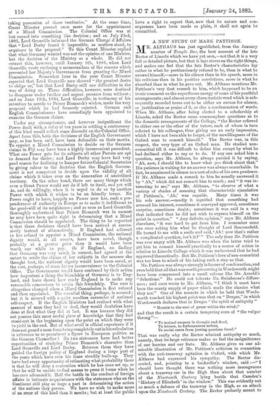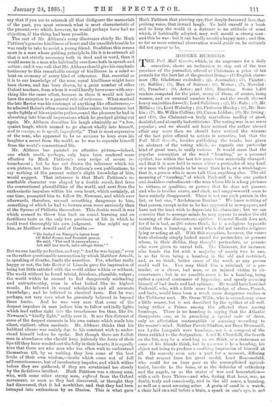A NEW STUDY OF MARK PATTISON.
MR. ALTHAUS has just republished, from the January number of Temple Bar, the best account of the late Rector of Lincoln which we have yet seen,—not that it is a very full or detailed picture, but that it lays stress on the right things, and makes one feel that the late Rector's characteristics lay rather in what he pertinaciously refused to be, than in what he avowed himself,—more in his silence than in his speech, more in his criticism than in his positive convictions, more in what he absorbed than in what he gave out. Mr. Althaus mentions Mr. Pattison's very first remark to him, which happened to be an ironic comment on the superfluous energy of some of his youthful arrangements ; and almost every characteristic word which is subsequently recorded turns out to be either an excuse for silence, or justification or praise of it, or else a condemnation of words. When Mr. Althaus, after being elected to a scholarship at Lincoln, asked the Rector some commonplace questions as to the domestic arrangements of the College, "the Rector referred to either one or the other of the tutors, each of whom in turn referred to his colleague, thus giving me an early impression, which I have not been able to forget, of the unwillingness of the Oxford man to commit himself." The Rector was, in this respect, the very type of an Oxford man. He studied noncommittal till it was difficult to define him except by what he had declined either to say or to do. If any one asked him a question, says Mr. Althaus, he always parried it by saying, " Ah, now, I should like to know what you think about that." His patience in waiting for an answer was always remarkable. In fact, he acquiesced in silence as a sort of echo of his own prudence. If Mr. Althaus made a remark to him he usually answered it by " Ah," which did not commit him to much ; and "it was interesting to me," says Mr. Althaus, "to observe of what a variety of shades of meaning that characteristic ejaculation
of Pattison's, 'Ah,' was capable. Many times it was his sole answer,—mostly it signified that something had aroused his interest, sometimes it conveyed approval, sometimes surprise, sometimes doubt ; sometimes it was said in a way that indicated that he did not wish to express himself on the point in question." "Any definite opinion," says Mr. Althaus elsewhere, "it was hard to get from him. I remember some one once asking him what he thought of Lord Beaconsfield. He turned to me with a smile and said, ‘Ah ! now that's rather a complicated question, isn't it P' " The only time Mr. Pattison was ever angry with Mr. Althaus was when the latter tried to get him to commit himself practically to a course of action in relation to Lincoln College which it was understood that he had approved theoretically. But Mr. Pattison's love of non-committal was too keen to admit of his taking such a step as that.
Mr. Pattison was always strongly in favour of condensation, and even held that all that was worth preserving in Wordsworth might have been compressed into a small volume like Mr. Arnold's "Selections." He could not tolerate Mr. Swinburne's diffuseness; and once wrote to Mr. Althaus, "I think it must have been the scanty supply of paper which made the classics what they are." One of the sonnets in which he held that Wordsworth touched his highest point was that on "Bruges," in which Wordsworth declares that in Bruges "the spirit of antiquity"
"Mounts to the seat of grace within the mind ;"
and that the result is a certain tempering even of "the vulgar throng "— That was really why the Rector admired antiquity so much, namely, that its large reticence makes us feel the insignificance of our hurries and our frets. Mr. Althaus gives us one admirable illustration of Mr. Pattison's criticism in connection with the anti-tramway agitation in Oxford, with which Mr. Althaus had expressed his sympathy. The Rector dissented, and, pointing to a bookseller's window, said :—" I should have thought there was nothing more incongruous about a tramway-car in the High than about that number of the Nineteenth Century lying beside that Camden's 'History of Elizabeth' in the window." This was evidently not so much a defence of the tramway in the High, as an attack upon the Nineteenth Century. The Rector probably meant to say that if you are to retrench all that disfigures the memorials of the past, you must retrench what is most characteristic of the present,—to which, however, he would perhaps have had no objection, if the thing had been possible.
The rest of Mr. Althaus's essay illustrates chiefly Mr. Mark Pattison's genuine kindliness of heart and the unselfish trouble he was ready to take to assist a young friend. Doubtless this means more in a man whose guiding principle in life it is to retrench all that is not strictly necessary both in deed and in word, than it would mean in a man who habitually overflows both in speech and action ; and it was well that Mr. Althaus should give his emphatic testimony to this remarkable energy of kindliness in a mind so bent on economy of every kind of utterance. But, essential as it is to our knowledge of the man, equal kindliness might have been shown, and has been shown, by a great number of other Oxford teachers, from whom it would hardly have come with any
thing like the same effect, because in them it would not have been the exception to a general rule of reticence. What marked the late Rector was his contempt of anything like effusiveness,—
he admired Heine's often coarse and bitter satire, for instance, but spoke lightly of his exquisite pathos,—and the pleasure he had in absorbing into himself impressions which he grudged giving out again. Mr. Althaus describes his laugh admirably as "a low, quaint laugh, which seemed to go almost wholly into himself,
and to emerge, so to speak, imperfectly." That is most expressive of the man, who appeared to be as anxious to keep even his
laughter a secret from the world, as he was to separate himself from the world's conventional life.
Mr. Althaus has painted an effective picture,—indeed, one which could, perhaps, only have been rendered more effective by Mark Pattison's own recipe of severe retrenchment ; but he has not drawn the inference which his own picture, not less than Mr. Pattison's own publications, to say nothing of the present writer's slight knowledge of him, would suggest. That inference is that Mark Pattison's remarkable character was shaped by a double recoil, first from the conventional plansibilities of the world, and next from the enthusiastic impulses within his own heart, which certainly, at one time, prompted him to follow Dr. Newman, and which ever afterwards, therefore, seemed something dangerous to him, something of which he had to beware even more anxiously than of the Syrens of Philistia themselves. This double recoil it was which seemed to throw him back on sound learning and on fastidious taste as the only two provinces of life in which he could trust thoroughly his own judgment. One might say of him, as Matthew Arnold said of Goethe :—
"He looked on Europe's latter hour
Of fitful dream and feverish power. • He said, The end is everywhere ; Art still has truth, take refuge there.'"
But we can hardly go further, and say, "And he was happy," even on the rather questionable assumption by which Matthew Arnold, in speaking of Goethe, limits the assertion. For, whether really happy or not, the late Rector of Lincoln gave the impression of being but little satisfied with the world either within or without. The world without he found trivial, frivolous, plausible, vulgar ; the world within he seemed to feel dangerously misleading and untrustworthy, even in what looked like its highest moods. He believed in sound scholarship and all accurate knowledge ; and he believed in classical taste. But he was,
perhaps, not very sure what he genuinely believed in beyond these limits. And he was very sure that some of the deepest impulses in man induce him to follow unkindly lights which lead rather right into the treacherous fen than, like Dr.
Newman's "kindly light," safely over it. It was this distrust of some of the deepest currents in his own nature which made him silent, vigilant, often sardonic. Mr. Althaus thinks that his habitual silence was mainly due to his constant wish to under stand himself before he spoke. But though there are foolish men in abundance who should keep jealously the doors of their lips till they have weeded-out the folly in their hearts, it is equally true that there are wise men who too often wait to understand themselves till, by so waiting, they lose some of the best fruits of their own wisdom,—fruits which come not of full self-consciousness, but of involuntary impulse, and which wither
before they are gathered, if they are scrutinised too closely by the fastidious intellect. Mark Pattison was a strong man, who, with some other strong men, suffered from the Oxford
movement, so soon as they had discovered, or thought they had discovered, that it led nowhither, and that they had been betrayed into enthusiasm by an illusion. This is what gave Mark Pattison that piercing eye, that deeply-furrowed face, that probing voice, that inward laugh. To hold oneself in a leash and to keep the world at a distance is an attitude of mind which, if habitually adopted, may well mould a strong man : and this he was : but it can hardly mould a happy man ; and this, so far as mere external observation would guide us, he certainly did not appear to be.







































 Previous page
Previous page